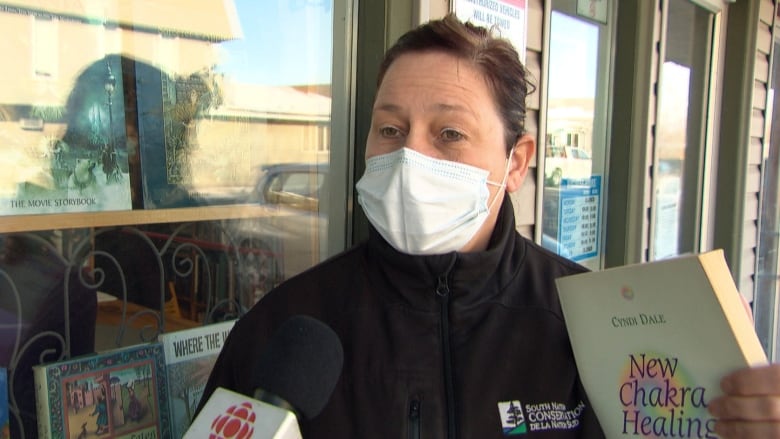She saved 200,000 books from the landfill and hopes to find them all a home | CBC News
Standing amidst her towering piles of books, with barely enough room to move between them, Myriam Gaudet clings to the belief that each one will find a new home.
Gaudet, who owns Red Cart Books in Cornwall, Ont., now has a barn and two other farmhouses on the same property full of donated hardcovers, paperbacks and coffee table books, spanning every genre imaginable.
“If I don’t take them, they go to the landfill. So I take them,” she said.
“I just wish we could hang onto them long enough until the right person comes looking for them, because eventually — pretty much every book — someone will come looking for it.”

After five years of collecting unwanted books from local thrift stores that would otherwise be tossed in the local dump, Gaudet has amassed nearly 200,000 titles.
However, this wealth of literature poses some unique problems.

The books are essentially in deep storage, inaccessible to customers and unsearchable by the bookstore’s three-person staff since most of them aren’t catalogued. Gaudet is also close to maxing out the storage space she has available.
She predicts that within a few months, she’ll run out of room in her family’s farm buildings and be forced to stop accepting new donations.

Books come from thrift stores
What Gaudet calls a “tsunami of books” is flooding in primarily from seven thrift stores in the Cornwall area. Often, donated books can’t be sold in a timely fashion, and so they are taken off the shelves and deposited at the local dump.
Gaudet said she learned of the problem a few years ago, when she ran the book department at a for-profit thrift store. More than three-quarters of the donated books were never sold.

After leaving that job, she started Red Cart Books. For the first year, it was an online-only venture, focused primarily on selling off a collection of roughly 4,000 books for a friend.
But things changed when a former colleague, now working at another thrift store in the area, contacted Gaudet to find out if she could take some of the store’s overflow books, thus diverting them from the landfill.
Gaudet began stopping by every week to collect unsold books. At first, the inventory that didn’t fit into her tiny storefront on Pitt Street was stored on neat rows of shelves set up in the Gaudet family farmhouse, alphabetized and catalogued.

But then she began contacting other thrift stores to see if they had any books destined for the dump that she could take off their hands.
One thrift store soon became seven.
Too much of a good thing
Julie Leroux manages the Salvation Army Thrift Store in Cornwall. For the last three years, she says, the store has set aside 300 to 700 books for Gaudet every week. She’s delighted the books aren’t going to waste.
“[Myriam’s] vision, her need for books … is just as strong as ours,” she said. “We want to make sure everybody gets the chance to be able to read.”

These days, each time Gaudet makes her weekly rounds, she returns with more than 2,000 books, but now she has “no place to put them.”
In late December, she posted on her store’s Facebook page searching for a solution.
She has a tentative plan to build a small storage building, but there are limits to what she can afford.
“Nobody gets rich running a bookstore,” she said. “You do it because you love books.”

‘Value to every book’
Gaudet is fuelled by the desire to hold onto the books long enough for the right buyer to come along.
Monique Sauvé came to Red Cart Books looking for a guide on meditation to help her make use of the healing room she had just created in her home.
She says it’s difficult to find good books on the topic, but New Chakra Healing by Cyndi Dale — once destined for the landfill — was sitting on a shelf waiting for her.
“It’s nice to see that they’re not being thrown out, because there’s value to every book,” Sauvé said.

For all the latest Entertainment News Click Here
For the latest news and updates, follow us on Google News.

